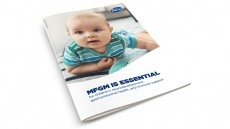High consumption frequency of cheese and yoghurt could reduce occurrence of asthma symptoms – Iran study

Data suggests that Iran has a higher and faster rate of asthma prevalence than the world average in adolescents aged between 13 and 14 years. Wheezing, coughing, shortness of breath, and chest tightness are common asthma symptoms.
According to previous studies, more than half of the people with asthma change their eating habits, with dairy products being the most typically avoided food.
However, the results of epidemiological studies investigating the association between dairy intake and asthma in children are inconsistent, with data on Middle Eastern countries especially limited.
As such, a group of researchers in Iran aimed to elucidate the potential relationship between consumption of milk and other dairy products, and asthma and its symptoms.
The cross-sectional study was conducted on children aged 6 to 7 and adolescents aged 13 to 14. It was part of the Global Asthma Network (GAN), which took place in Yazd, central Iran, in early 2020.
In total, 7,667 participants were included in the study. The younger group’s parents and the older participants filled out online questionnaires on asthma, symptoms and risk factors.
Dietary intake in the last 12 months was assessed using a multiple-choice GAN questionnaire.
The participants answered questions on consumption frequency (never or only occasionally; once or twice per week; most or all days of the week) of milk, other dairy products (yoghurt, cheese, cream, top milk, and kashk), and total dairy.
It was found that there is no association between dairy consumption and doctor-diagnosed asthma, current asthma, or asthma medication use.
Although there is no association between the intake of other dairy products and the likelihood of wheezing in the crude model, a significant inverse association between other dairy products (most or all days) and the risk of wheezing was identified after adjusting for several confounders.
“The findings showed that the consumption of dairy products other than milk, such as cheese and yoghurt, might reduce the likelihood of wheezing in children and adolescents,” the authors wrote.
Notably, 7.5% of the participants experienced wheezing in the past 12 months did not have asthma diagnosed by a doctor. This could be due to the onset of symptoms at an older age, or the possibility that some individuals developed wheezing after contracting a respiratory illness such as COVID-19 or flu.
On the other hand, 83% of participants with doctor-diagnosed asthma did not experience wheezing in the last 12 months, which may be the result of an inaccurate diagnosis or effective management of the condition.
Potential pathways
The relationship between asthma and dietary nutrients has been explored by various studies, with some noting that consuming dairy products — even just a few times a week — had an inversely significant influence on asthma, compared to never eating them.
The beneficial effect of milk and butter may stem from the fatty acid content, in addition to the fact that the digestion of lactose is different from other carbohydrates.
“The prebiotic activity of dairy products probably results from stimulating the growth of beneficial bacteria in the intestines, which may modulate immune responses and thus has a protective effect against asthma and allergies,” the authors said.
Milk proteins, including lactalbumin, lactoglobulin and immunoglobulins, whey proteins such as serum albumin, lactoferrin, and lactoperoxidase, as well as enzymes and cytokines found in dairy products are believed to be responsible for this protective effect.
Many researchers have also looked at both preventative and therapeutic effects of yoghurt and the lactic acid bacteria that are widely utilised in yoghurt production.
In particular, the relationship between cytokine imbalance and asthma symptoms has gained attention.
Interferon-gamma (IFN-γ) is a cytokine that plays an important role in inducing and modulating immune responses. Incomplete IFN-γ production reportedly predisposes an individual to the development of allergy disorders and asthma.
“Human studies showed that long-term consumption of substantial amounts of yoghurt (450g per day) resulted in boosting the production of IFN-γ by lymphocytes and separated T cells.
“Furthermore, oral ingestion of Lactobacillus casei and other probiotic strains has been shown to reduce immunoglobulin E (IgE) production. These findings suggest that eating yoghurt could help reduce IgE-mediated diseases, including asthma.”
Conjugated linoleic acid (CLA) is another probable pathway discussed in previous studies.
These compounds have a wide range of biological features that could help asthma sufferers, including their effect on energy, lipid metabolism, inflammation, and immunological function.
“The metabolic functions of CLA, including fat loss and adipokine regulation, may be beneficial for respiratory mechanics and systemic inflammation, which may apply to asthmatic airway inflammation.”
It should be noted that the current study has several limitations, such as the sole reliance on self-reported data, lack of information on other variables like energy intake, physical activity and eating habits among different ethnicities, and the inability to infer causal association.
“In our study, results can only be drawn from the relation between the frequency of dairy consumption and wheezing in the previous 12 months. However, wheezing can be caused by diseases such as gastroesophageal reflux, recurrent viral respiratory tract infections, and persistent bacterial bronchitis, among others.
“Therefore, it cannot be concluded that consumption of dairy products necessarily leads to protection against asthma. Future prospective cohort studies are highly recommended to confirm our findings.”
Source: Frontiers in Nutrition
https://doi.org/10.3389/fnut.2024.1298704
“Dairy intake in association with asthma symptoms among a large sample of children and adolescents: a cross-sectional study”
Authors: Mona Jamalvandi, et al
Pre-, pro- and post-biotics will be a major topic of focus at Growth Asia Summit 2024 this year – join us in Singapore to learn more on insights from major industry experts, find out more here.











